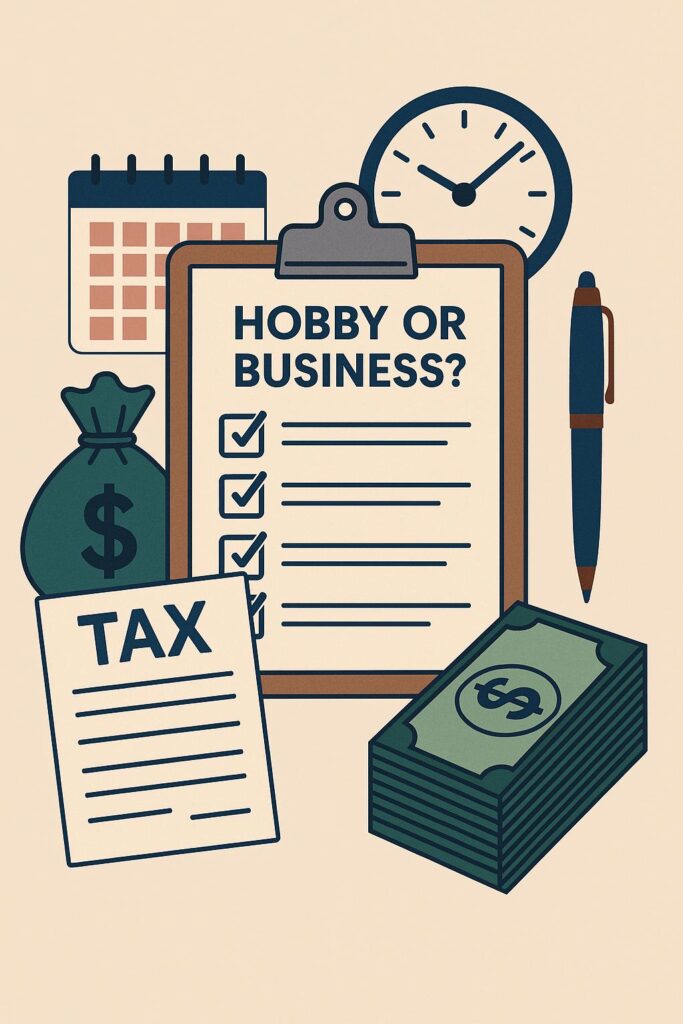
Is Your Side Hustle a Business or a Hobby in the Eyes of the IRS?
Why It Matters: Taxes, Deductions, and IRS Scrutiny
If you earn money from a side hustle — whether it’s freelance work, selling on Etsy, photography gigs, or dog walking — the IRS wants to know: is it a business or a hobby? The answer affects whether you can deduct expenses and how your income is reported on your tax return. Misclassifying your activity can lead to audits or denied deductions, especially under the IRS hobby loss rule.
The IRS Hobby vs Business Test
The IRS does not provide a strict dollar threshold or time commitment to define a business. Instead, it uses a multi-factor analysis to determine whether you are engaged in the activity “with the intent to make a profit.” These nine factors help determine your intent:
- How you carry on the activity – Do you operate in a businesslike manner with accurate books and separate finances?
- Your expertise – Do you have knowledge or professional experience in the field?
- Time and effort – How much time do you devote to the activity?
- Expectation of asset appreciation – Is there potential for long-term gain even if not currently profitable?
- Your success in similar activities – Have you turned similar ventures into profitable businesses before?
- History of income or losses – Are you constantly losing money or have you shown improvement?
- Occasional profits – Have you made a profit in some years?
- Your financial status – Do you depend on the income or is it just for fun?
- Personal pleasure – Is this something you do primarily for enjoyment?
No single factor is decisive, but a consistent pattern of losses with no business practices or intent to make money will weigh against you.
Why the Classification Affects Your Taxes
If your side activity qualifies as a business, you can report income and claim ordinary and necessary expenses on Schedule C (Form 1040). That includes deductions for supplies, mileage, advertising, home office space, and more. Your net profit is subject to both income tax and self-employment tax.
If the IRS classifies your activity as a hobby, you must still report income — but cannot deduct any related expenses, even if you lost money doing it. This change came with the Tax Cuts and Jobs Act of 2017, which eliminated miscellaneous itemized deductions for hobby expenses.
Common Examples: Hobby or Business?
- Selling handmade crafts online – If you keep records, advertise, reinvest profits, and track inventory, this is likely a business. If you occasionally sell things for fun, it’s likely a hobby.
- Freelance writing – Earning consistent income, pitching clients, and tracking invoices points to a business.
- Car photography on weekends – If you’re primarily doing it for enjoyment with no organized operations, it’s likely a hobby.
How to Protect Your Side Hustle from IRS Reclassification
To solidify your position as a business and avoid issues under the hobby loss rule, consider the following:
- Separate business and personal finances (use a business bank account)
- Keep detailed records of income, expenses, advertising, and operations
- Build a business plan, even if informal
- Document your efforts to improve profitability
- File all required tax forms and pay estimated taxes if applicable
The IRS is far more likely to respect your deductions when you treat your side hustle like a business.
Filing Tips for Side Hustlers in 2025
When filing your 2025 return, side hustlers should use Schedule C to report income and expenses. Be sure to track all digital payments — including those reported on Form 1099-K if you received $600 or more from platforms like PayPal or Venmo.
See the IRS resource on Understanding Your Form 1099-K to better understand reporting thresholds and what to expect this year.
Final Thoughts
The difference between a hobby and a business is more than semantics — it’s a tax distinction that impacts your liability, deductions, and audit risk. If your side hustle generates income, treating it like a business from day one is the smartest path.
Make sure you follow the IRS criteria for business activity and document everything. The IRS may be watching, especially with increased enforcement in 2025. Don’t give them an excuse to reclassify your hustle and disallow your deductions.
Disclaimer
Disclaimer: The information provided in this blog post is for informational purposes only and should not be construed as legal, tax, or accounting advice. Tax situations are often complex and highly specific to the individual or business. You should contact a qualified tax expert directly to discuss your particular circumstances. Nothing herein is intended to, nor does it, create an attorney-client or advisor-client relationship. For individual guidance, please contact us directly.


